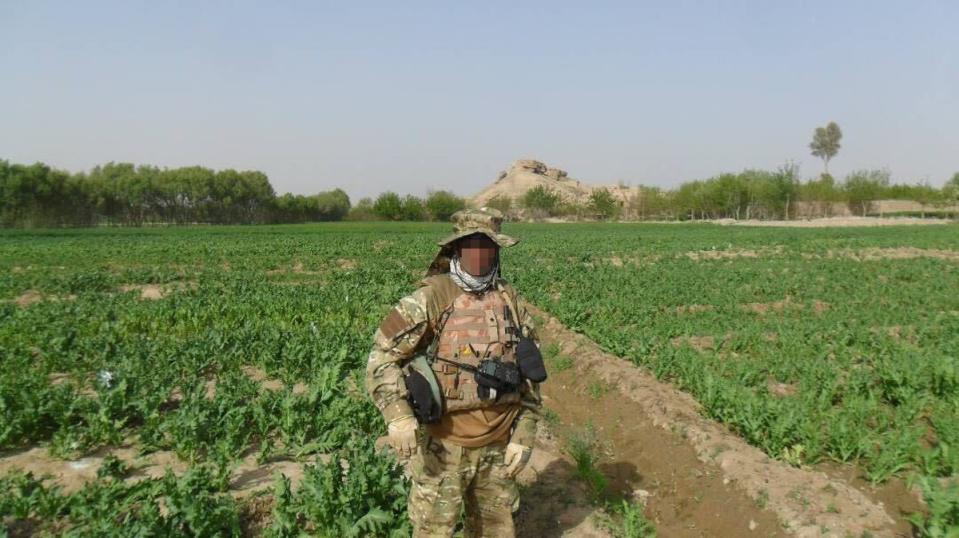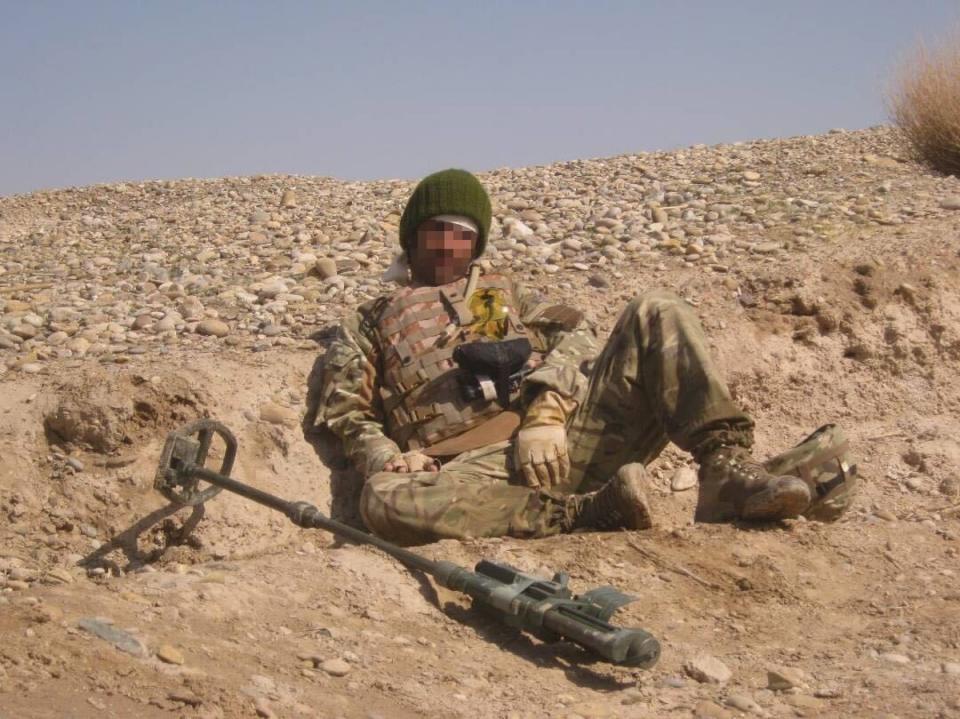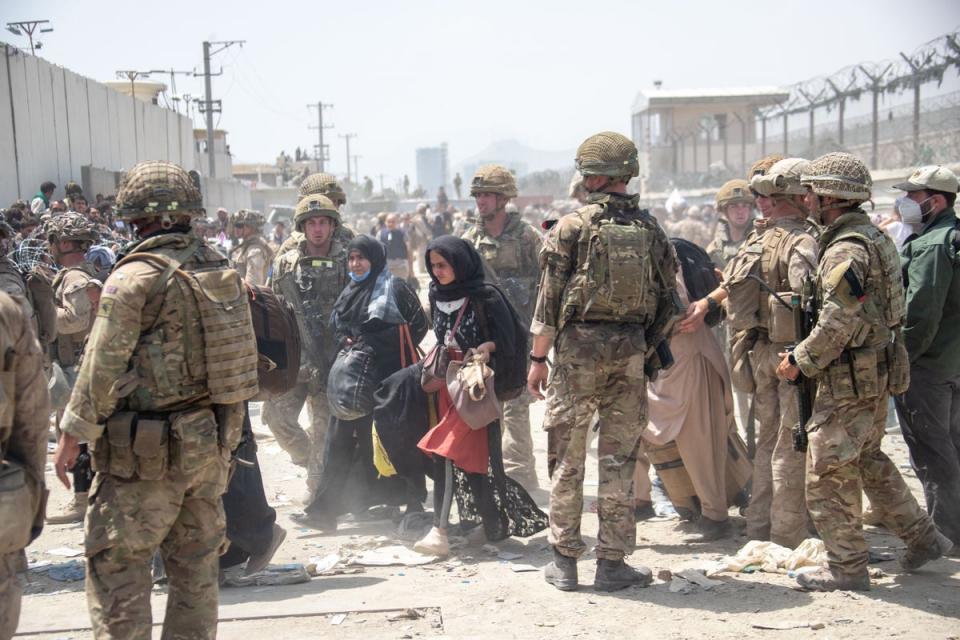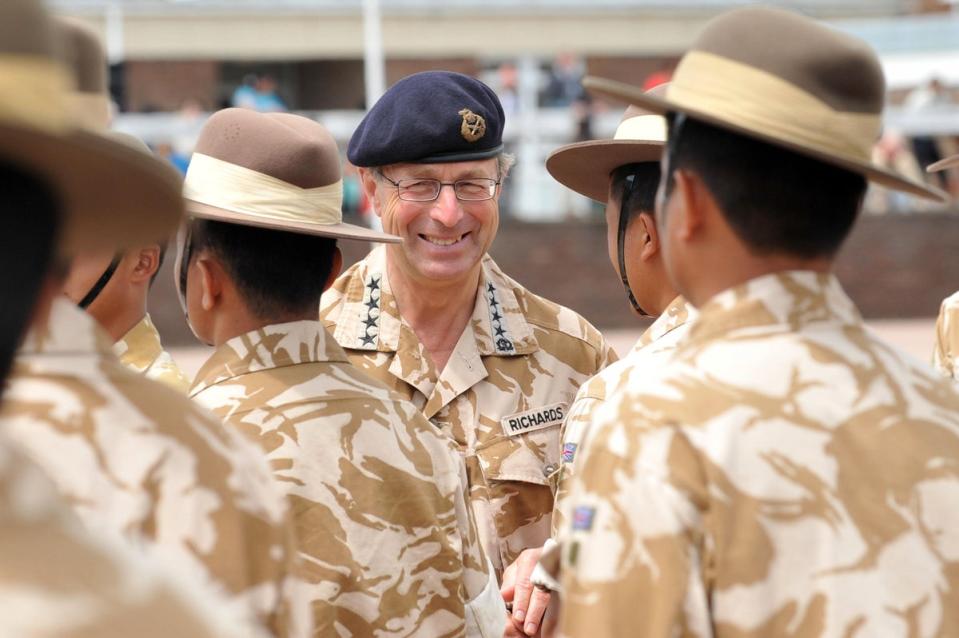Thousands of Afghans in limbo two years after fall of Kabul – as Sunak urged to keep UK promise

Thousands of Afghans are still waiting to hear if they will be brought to safety in the UK two years after the fall of Kabul – despite ministers pledging to slash the backlog to zero within days.
Around 18,000 unique applications for Afghans who say they worked alongside British troops are still waiting to be processed under the Afghan Relocations and Assistance Policy (Arap).
And 3,400 Afghan men, women and children who have already been approved for relocation under the Ministry of Defence scheme remain stranded in the country in the grips of a Taliban crackdown or have been left to languish in hotels in Pakistan.
The failure to act flies in the face of the government’s 2021 pledge to “shift heaven and earth” to move people out of Afghanistan, prompting multiple calls for Rishi Sunak to personally intervene.
Revenge killings, arrests and disappearances under Afghanistan’s rulers have left those who worked with the British in fear for their lives, while those stuck in Pakistan are scared to leave their hotels because their visas have started to run out.
General Lord Richards, the former chief of defence staff, said the government’s lack of action was “beyond the pale” and he urged the prime minister to “sort this out personally”.
Labour MP and former soldier in Afghanistan Dan Jarvis called on Rishi Sunak to “get a grip, get a plan and get these brave men and women to safety”, while General Sir John McColl, the army’s former deputy supreme allied commander for Europe, said the government seemed to have “no plan” for how they would relocate these people.
He said the government’s requirement that Afghans eligible for relocation should find their own accommodation in the UK before they are moved was “an extraordinary ask” that “they know is impossible”.
General Sir Richard Dannatt, former head of the British Army, said the process of getting entitled people to the UK should be “sped up”, and Lord Alf Dubs – a child refugee who fled the Nazis before the Second World War – said it would be a “disgrace to ignore people we’ve promised to help”.
And the Afghan pilot, who The Independent has been campaigning to get asylum in the UK, called on the government to help those still in danger and trapped abroad. He urged: “Do not sacrifice the Afghan soldiers who fought heroically and sincerely against the common enemy for years. Do not leave them. Stick to the covenant you made with them.”
In an attempt to clear the backlog of applications in time for the end-of-August deadline, decisions made by the Ministry of Defence’s Arap team have been dramatically sped up, The Independent can reveal.
Around 36,000 applications were rejected between the start of the Arap scheme in April 2021 and 21 June this year, figures revealed in response to a parliamentary question show.

But since then, a huge number of rejection letters have been sent out, with the government claiming to have now found over 69,000 applications ineligible – an increase of over 32,000 in just over a month.
The MoD said it had “made huge improvements in our casework processes and systems”, adding: “We now have over 100 case-work staff and automated processes in place.”
A total of 141,000 applications have been received since the scheme’s launch but just 3,527 of those have been granted eligibility, the latest official figures show.
Some 255 Afghans who worked with the British Army and are eligible for relocation to the UK are still living in hiding in Afghanistan. Together with their dependent family members, this means a total estimate of 1,950 people are stuck in the Taliban-run country.
A further 1,400 people who have been accepted to come to the UK are stuck in British High Commission hotels in Islamabad, Pakistan – with only 35 relocated to the UK since 1 December.
A further 490 people eligible under the government’s scheme for at-risk Afghans, ACRS, are also stuck in Pakistan.

One former interpreter who was embedded with British troops said the hotel he was stuck in with his family was “like prison”.
He told The Independent: “Our Pakistan visas have expired, we cannot go anywhere because of the Pakistani police. Our children have no school or education, we are all jobless and hopeless. The British government make promises but they do not transfer us to the UK.”
A British Council teacher, who has eligibility under the ACRS scheme, has been waiting in her hotel for seven months. She said: “I am in a cramped room with no access to education or health care. I have no job or income and I have a newborn son, whose life is confined to just one bed. Our visas have expired and we cannot go out for fear the police will send us back to Afghanistan.”

Lord Richards, the former head of the UK armed forces, said: “I and many others who had the privilege of serving in Afghanistan alongside our Afghan comrades have been very patient over the last two years, but the confusion and lack of action on the part of government is now beyond the pale and they must resolve this.”
He added: “They must now appoint a single minister to grip this disgraceful situation. The prime minister must sort this out personally.”
Senior Tory MP Julian Lewis said those who worked with British forces had the “strongest possible claim” to sanctuary in the UK. The former defence committee chief said: “Many are in daily peril, even in Pakistan where the authorities are unsympathetic. They should not be left exposed, in this way, to the revenge of the Taliban.”
Lord Dubs said: “The government has to hurry up and get people it has committed to helping out – it’s not good enough at the moment. We have a responsibility to the people stuck in Afghanistan who are in great danger, and the Afghans in Pakistan in very difficult circumstances too. Lack of housing is no excuse.”
Mr Jarvis said it would be a “shameful act of betrayal to turn our backs now”. He added: “There are still over 3,000 Afghans – people we promised safe passage to the UK – left behind in mortal peril.”

Gen McColl added: “These are people who fought alongside us, who have been through the very strict Arap and ACRS tests. These are people who we have a debt to. We have given an undertaking that we will look after them and at the moment we are definitely not doing so.”
Gen McColl and other military chiefs and politicians wrote to Rishi Sunak in July asking him to work urgently to relocate those eligible to the UK but they have received no response.
Veterans minister Johnny Mercer told parliament on 23 March that more details would be provided “in due course” of how those stuck in Pakistan and other countries would be supported. So far, no plan has been announced.
General McColl added: “As far as I can tell, there is nobody working on it. It’s completely chaotic and what they need is a focus to deliver the plan.”
Lord Dannatt said he had been told by the MoD that the government was reluctant to bring in more people from Afghanistan and Pakistan until it had cleared the backlog of Afghans in hotels in Britain first.
He said: “It isn’t easy. We have to acknowledge that the government and local authorities have a huge housing problem. The system is struggling. But we have a responsibility. Pressure has to be applied on local authorities to find suitable accommodation.”

Shadow veterans minister Rachel Hopkins said the Conservatives were “failing Afghans who risked their lives helping our armed forces.”
She added: “Two years after the Taliban takeover, it’s shameful that thousands of Arap applications are still to be processed despite the government promising to clear the backlog by the end of this month. Eligible Afghans have been left in hotels in Pakistan or even remain stuck in Afghanistan. Britain’s moral duty to assist Afghans is felt most fiercely by UK forces they served alongside.”
A government spokesperson said that due to pressures on accommodation in the UK, it was not possible to say how long eligible Afghans would have to wait for relocation.
They added: “The UK has made an ambitious and generous commitment to help at-risk people in Afghanistan and, so far, we have brought around 24,600 people to safety, including thousands of people eligible for our Afghan resettlement schemes.
“We continue to honour our commitments to bring eligible Afghans to the UK, and we are issuing new visas to people in Afghanistan and other countries for resettlement here. However, it is vital those arriving have somewhere suitable to stay once they are in the UK, so they can start their new life in the UK.”


